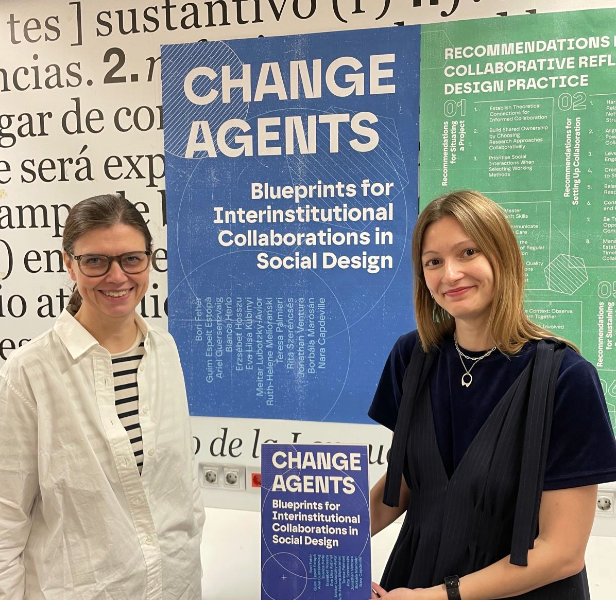
Ruth-Helene Melioranski and Eva Liisa Kubinyi
The publication of the EKA social design project “Change Agents — Blueprints for Interinstitutional Collaborations” has been published.
EKA social design specialists, Dean of Faculty of Design of EKA Ruth-Helene Melioranski and Junior Research Fellow in Social Design Eva Liisa Kubinyi have published the results of two years of research, which are now available for free download here.
The book can be requested from the EKA Library.
Ruth-Helene Melioranski and Eva Liisa Kubinyi presented their new book “Change Agents — Blueprints for Interinstitutional Collaborations” at the Social Design Conference held at Elisava University of Design and Engineering in Barcelona on November 21, bringing to a close a two-year project.
Nothing is Permanent Except Change
In a rapidly changing world, people and communities need ways to adapt to new challenges. The Change Agents project answers questions about how to guide change towards a better future and how design thinking and interdisciplinary collaboration can advance society.
The project, launched in early 2023, was led by the Moholy-Nagy University of Art and Design (MOME). The partners were Elisava University of Design and Engineering in Barcelona, the Estonian Academy of Arts, the University of the Arts in Berlin, the Free University of Bolzano, and Shenkar College in Israel. The Estonian Academy of Arts was represented by Ruth-Helene Melioranski, Eva Liisa Kubinyi, and Hedi Meigas.
The project focused on developing methods and strategies that support cooperation between NGOs and higher education institutions in design education. The publication includes practical recommendations on how to create effective partnerships, plan processes and set success criteria.
“The collaboration in the Change Agents project has helped to significantly better understand the cooperation with communities at EKA,” explained Ruth-Helene Melioranski.
“Eva and I led the process of creating the second part of the book, the recommendations and guidelines, which in turn summarized the knowledge and experiences gathered throughout the project.”
Eva Liisa Kubinyi added: “The aim of the project is to facilitate cooperation between NGOs and academia by promoting collective reflection practices. This guideline helps to ensure dialogue and transparency between the different parties.”
The project is co-funded by the European Union’s Erasmus+ programme.
The project partners are members of the Social Design Network.![]()
